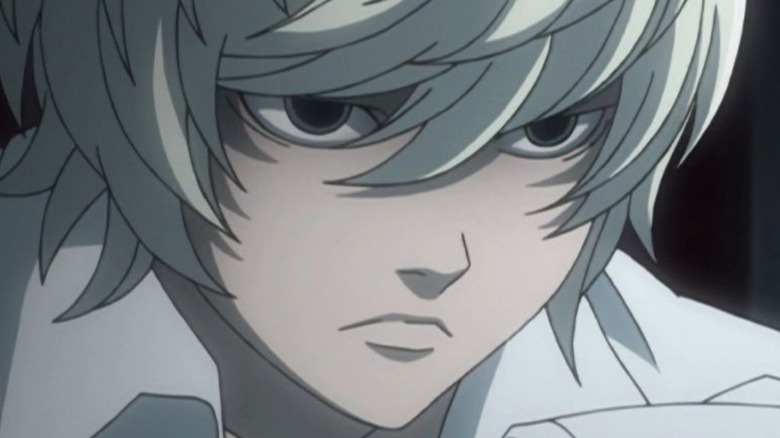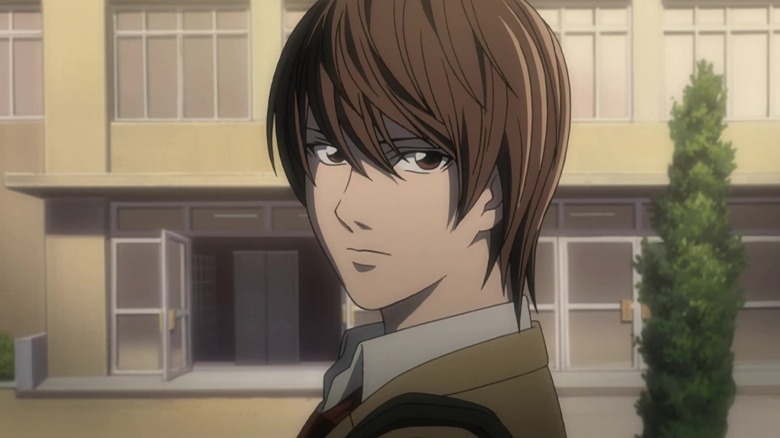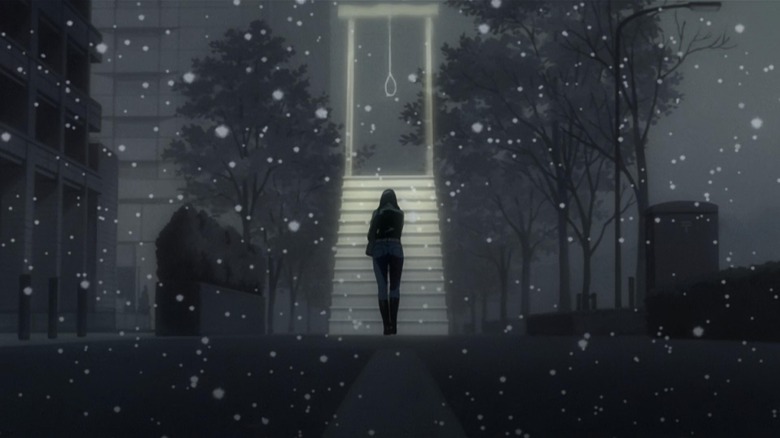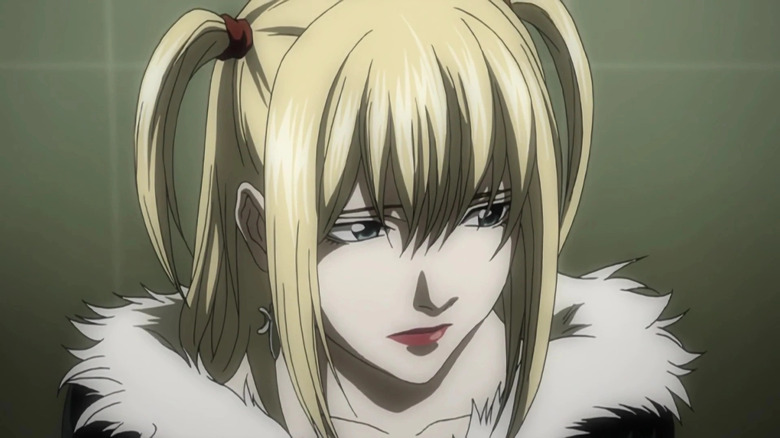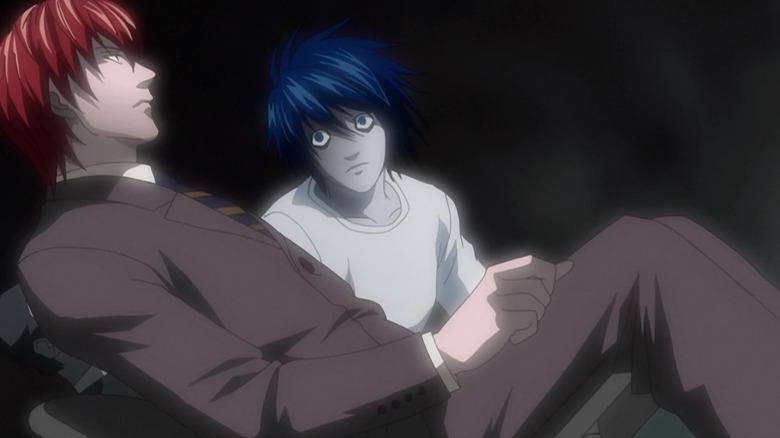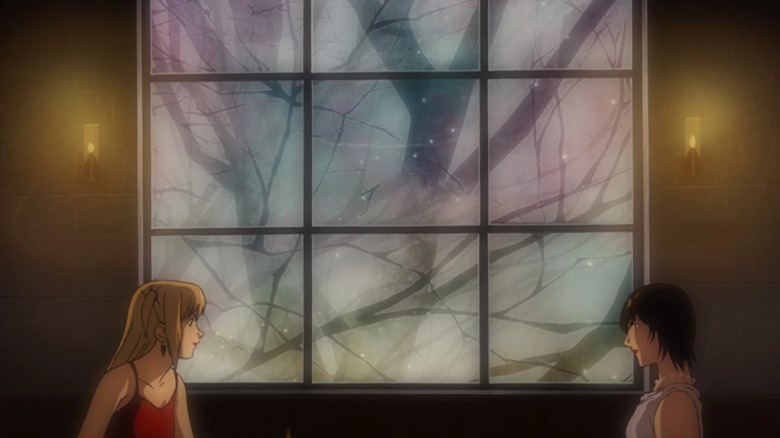Death Note Filler Episodes You Should Always Skip
When it comes to anime, "Death Note" is pretty mean and lean. Clocking in at just 37 episodes across two major story arcs, it's not a show that wastes a lot of time. That's just one of the many reasons it's considered to be one of the greatest anime shows of all time. But even the best anime shows often have some skippable episodes, and "Death Note" is no different.
Based on Tsugumi Ohba's manga of the same name, the anime follows high school student Light Yagami. Top of his class and more cunning than any 17-year-old you know, Light is a genius with a god complex. When he finds an otherworldly notebook that allows him to kill anyone simply by writing their name down, he starts to murder Japan's worst criminals one by one. Accompanied by the Shinigami Ryuk, Light goes on a killing spree that quickly gets the media's attention. Opposite our anti-hero is L, the anonymous detective who has dedicated himself to finding and stopping the mysterious vigilante, whom the press has dubbed "Kira."
Some "Death Note" fans claim that the show isn't worth continuing after the major event in Episode 25. The second arc features a different set of characters, but that doesn't mean it isn't worth seeing Light's journey come to its fated end. However, between one actual recap episode and a handful of other episodes that don't move the plot forward very much, there are a few parts of "Death Note" that can be skipped without harm. Read on to find out which episodes contain filler. Spoilers ahead.
Episode 1 - Rebirth
If you are unfamiliar with the concept the show is based on, it can't hurt to watch the first episode of "Death Note." The premiere diverges from the first manga chapter in how it sets everything up and how many people Light kills upfront, but it performs the same function in that it sets up the basics. You learn about the main character and discover his motivations, which appear noble to begin with.
We meet Light Yagami just before he finds the Death Note on the grounds of his school. He reads the instructions and, understandably, thinks it's just a joke, but he tests it out anyway and is shocked to discover that the notebook does indeed allow the user to anonymously kill a person — so long as they know their name and what they look like. Driven by a (somewhat childish) sense of justice, Light decides to become an almighty judge of good and evil in a new world he will create by killing off all criminals.
A Shinigami (gods of death in Japanese culture) named Ryuk shows himself to Light and reveals more about the notebook and the Shinigami realm, but none of that is pertinent to viewers just yet. The main conflict between Light and L doesn't really kick off until the second episode, so if you've seen "Death Note" before, "Rebirth" is totally skippable. The rules of the Death Note are established in this episode, but reiterated almost ad nauseam in the episodes that follow. The intro is not entirely filler, but it's pretty easy to pick the show up in Episode 2, the brilliant "Confrontation."
Episode 7 - Overcast
At the end of the sixth episode, it's pretty easy to figure out what Light's next move is going to be. He knows he needs to kill Raye Penber's fiancée, Naomi Misora, so the information she has on Kira doesn't get to the police. Aside from the iconic final shot of Misora walking towards the symbol of her impending death, there's nothing memorable about "Overcast," the seventh episode.
Misora is an ex-FBI agent who is on to Light, so she gives him a fake name. He spends the rest of the episode trying to figure out how to get her real name. It's admittedly fun to see Light in a sticky situation, but "Overcast" really drags this tension out to the point where Light's internal monologue becomes annoying. Eventually, he lies to her about working for L, and Misora inexplicably buys it, giving Light her real name and sealing her fate. The entire episode is interspersed with scenes of L and the detectives, which don't do a whole lot besides setting up the episodes that follow.
Redditor u/energeeon cited Episode 7 as the one that made them want to stop watching "Death Note," writing that they found it unbelievable that Naomi could be so easily outsmarted by Light. Most of the fans in the comments admitted that this was a moment where Light simply got lucky, and sometimes that has to happen for the story to move forward. Like the first episode, "Overcast" isn't 100% filler, but all you need to know is that Light kills Raye Penber's fiancée in questionable circumstances. Armed with that info, you can go ahead and skip right to Episode 8, in which L starts to close in on Light.
Episode 21 - Performance
One of the most popular characters from "Death Note" is Misa Amane. The bubbly girl obsessed with Kira comes off as annoying at first, but she becomes one of the most tragic characters of the show by the end. That being said, spending a whole episode with just her and the Yotsuba Group is a waste of everyone's time. Fans agree (via Reddit) that "Performance" is one of the few episodes you can definitely skip without worrying about missing anything important.
Misa, who wound up being the second Kira, relinquished her Death Note and has no memory of these actions. Now, she has been set up to infiltrate the Yotsuba Group of powerful elites by L. After her meeting with the Yotsuba Group, she is confronted by her Shinigami Rem, who fills her in on what she's done. In essence, the episode consists of one character telling another character about things we're already aware of.
Light and L don't really appear much in "Performance," which is perhaps why it seems like such a drag. By the end, Misa has learned which member of the Group is the new Kira and conveyed that to L, but that reveal is pretty inconsequential in the grand scheme of "Death Note," so you really aren't missing much here.
Episode 26 - Renewal
After Episode 25 puts an end to L's story and brings a sense of finality to the show, there is a quick reset before "Death Note" moves forward. Episode 26 of the series, "Renewal," is the biggest filler episode in the whole series. It spends half of its runtime with a recap of everything that has happened so far. This part is narrated by L for any fans who were missing him already. But seriously, if you've been paying attention up until this point, you can totally skip this episode. It's so rough that some viewers even found themselves wanting to drop the show after watching it (per Reddit).
The second half of "Renewal" does cover some new ground, spending some time setting up the remainder of the anime. We get to see how Light's plan to replace L and kill everyone who knows about the Death Note comes to fruition. But none of that really ends up mattering to the rest of the show because, suddenly, there is a time skip to five years later, when the investigation will pick up again. The episode teases — but doesn't even introduce us to — Light's new rivals, Near and Mello. Since neither of these characters are introduced until Episode 27, even the second half of this recap episode is worth skipping.
Episode 33 - Scorn
Just a handful of episodes before its fiery ending, "Death Note" decides to take one last diversion. Despite it being so close to the end of the series, nothing meaningful happens in "Scorn," the 33rd episode of the anime.
This episode takes too much time to focus on Light's love triangle with Misa and new flame Kiyomi Takada. The two argue over Light for no real reason. The only purpose of this scene is to allow the police to learn some new information about Light. The episode is especially skippable if you're watching "Death Note" for a second time — when you know what becomes of Misa and Takada in the next few episodes, it all seems a bit pointless.
Near goes to Japan to set up the finale, but he doesn't do a whole lot else in "Scorn." None of the events in this episode move the plot forward until the very end, when an SPK (Special Provisions for Kira) member finally discovers the identity of Light's accomplice, the criminal prosecutor Teru Mikami. This is the last episode that contains filler — after "Scorn," it's a straight shot to the finale.
